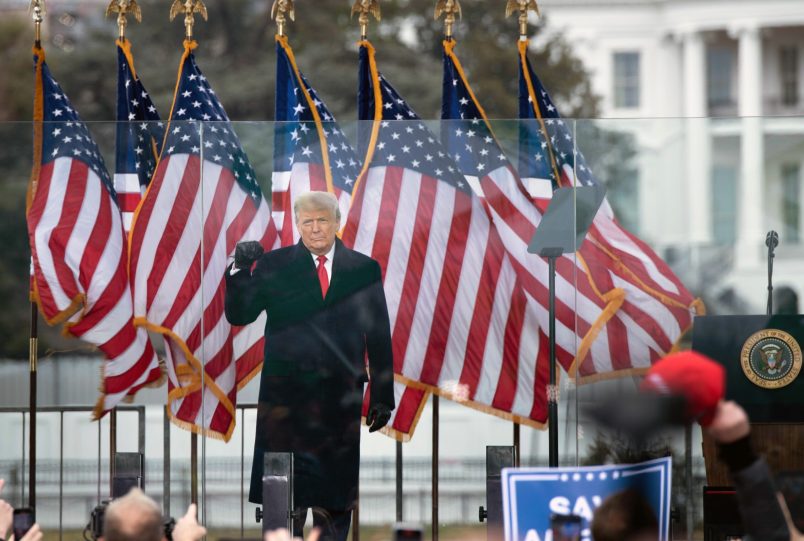The Supreme Court forced the state of Colorado to keep Donald Trump on the presidential ballot after the state’s Supreme Court found that the Constitution’s Disqualification Clause barred him from running for office.
The Court issued its ruling in a unanimous, per curiam order.
In a relatively brief, 13-page opinion, accompanied by one concurrence from Justice Amy Coney Barrett and another from the three liberals on the bench, the Court decided that the Constitution leaves the question of Trump’s disqualification to Congress.
“Responsibility for enforcing Section 3 against federal officeholders and candidates rests with Congress and not the States,” the Court ruled.
The ruling brings one of the most prominent efforts to hold Trump accountable for his attempt to stay in power after losing the 2020 election to an end. The Court, in oral arguments and in its Monday opinion, went out of its way to dodge the question of whether that attempt — which culminated in the Jan. 6 storming of Congress — constituted an insurrection.
Instead, the opinion focuses on a threshold question which all but ensures that the Disqualification Clause will remain a dead letter, at least as applied to Trump’s 2020 self-coup attempt. The justices focused instead on whose job it is to enforce Section 3 of the 14th Amendment, neatly excluding themselves from the equation. Instead, they kicked the issue of who should bar those who have taken an oath to the Constitution and then engaged in insurrection from holding office to Congress.
In so doing, the Court set up a new rule which extends beyond Trump: that Congress, and not the states, is responsible for enforcing disqualification against federal officeholders and candidates. To do that, the majority held, Congress must act.
Legislation isn’t the only option potentially available to Congress to decide whether a candidate is eligible for office. In one widely circulated amicus brief, a group of law professors warned about a potential nightmare scenario on the next Jan. 6, in which the Court ordered that Trump be placed on the ballot absent a decision on whether he engaged in insurrection, leaving an open question which could be resolved amid chaos during the same joint certification session which Trump violently disrupted last time around.
The majority’s suggestion that Congress must pass enforcement legislation, and not adjudicate disqualification through other means, could nudge Congress away from that path.
At the end, the majority adopted a concern which Trump’s attorneys raised across the disqualification cases: the chaos that would supposedly ensue if different states were to be permitted to decide who might appear on their ballot.
The concern ignores the federalist reality in which American elections are already conducted, with different rules, eligibility requirements, verification systems, and election management procedures existing in each state. But the Court, in the majority, feared “disruption,” which “could nullify the votes of millions and change the election result — if Section 3 enforcement were attempted after the Nation has voted. Nothing in the Constitution requires that we endure such chaos — arriving at any time or different times, up to and perhaps beyond the Inauguration.”
Writing in concurrence, Justice Amy Coney Barrett, and, separately, the three liberals made essentially the same point, though the liberals did so much more stridently. The question at hand, they all agreed, was whether an individual state could keep a presidential candidate found to have engaged in insurrection off of its ballot. But by finding that legislation is needed to enforce the disqualification clause, they wrote, the majority went far beyond what the case required.
“By resolving these and other questions, the majority attempts to insulate all alleged insurrectionists from future challenges to their holding federal office,” the liberal justices seethed.
The liberals also took shots at the majority’s supporting evidence for the finding that a legislative enforcement mechanism was needed, sneering in particular at its reliance on a non-precedential 1869 lower court case that even Trump’s lawyer didn’t fully embrace. They lingered over the oddity that the Constitution would require a congressional supermajority to remove the disqualification from office, if only a simple majority could moot the clause altogether by declining to pass legislation to enforce it. They also pointed out that other disqualifications from the presidency — including the two-term limit — do not require implementing legislation.
“These musings are as inadequately supported as they are gratuitous,” they wrote.
Barrett made a similar point, albeit more gently, arguing that the case presented did not compel the justices to decide whether legislation is the exclusive mechanism by which Section 3 can be enforced.
“Particularly in this circumstance, writings on the Court should turn the national temperature down, not up,” she wrote. “For present purposes, our differences are far less important than our unanimity: All nine Justices agree on the outcome of this case. That is the message Americans should take home.”
The liberals took her point a step further, steaming that the majority has not only gotten out over its skis, but fatally weakened attempts to disqualify insurrectionists going forward.
In an eye-catching jab, the three justices quoted from Stephen Breyer’s dissent in Bush v. Gore, a case which multiple conservative justices worked on for Bush.
“What it does today, the Court should have left undone,” the liberal justices cited.
“It reaches out to decide Section 3 questions not before us, and to foreclose future efforts to disqualify a Presidential candidate under that provision,” they wrote. “In a sensitive case crying out for judicial restraint, it abandons that course.”
CREW, the good government nonprofit which sought Trump’s disqualification in Colorado, said in a statement that “the Supreme Court removed an enforcement mechanism, and in letting Trump back on the ballot, they failed to meet the moment.”
Read the ruling here:







Cowards.
Well, damn those traitors…but no surprise.
Good News, Republican judges can’t DQ Biden in retaliation…
Failed at your first attempt to overthrow the US government and you’re a Republican?
Try, try again!
This was expected.